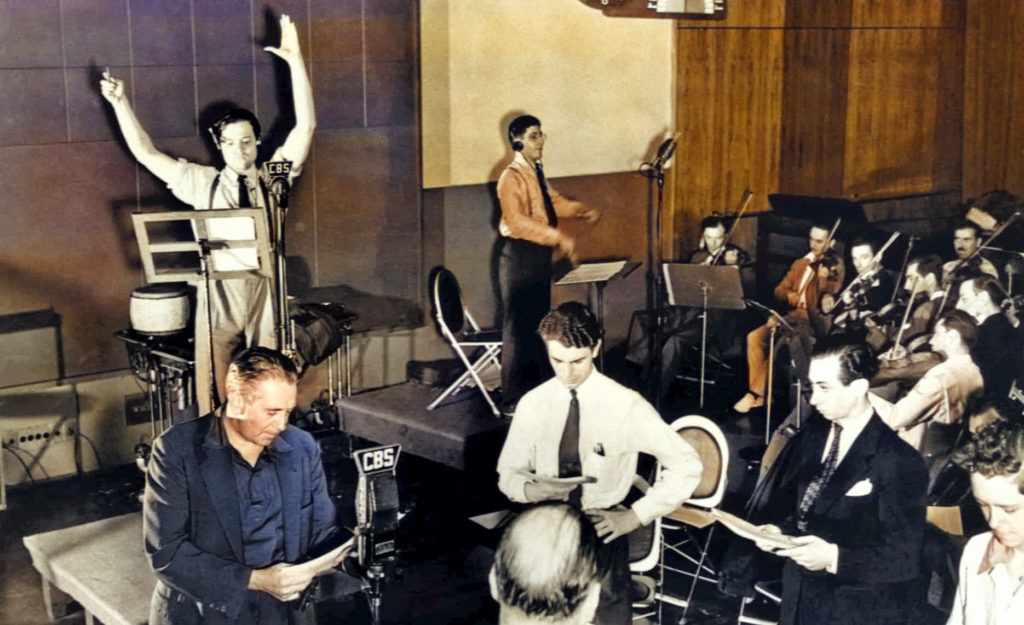It was a Saturday and I’d been asked to go to BBC Broadcasting House. I was booked for a session on acoustic guitar. I had no idea what it was and who else would be there, and more importantly what I was expected to play.
I turned up early and noticed large instruments being loaded in; Timpani drums, xylophones, bass drums, and other heavy orchestral plumbing. I had a single guitar in a soft bag, no amp, pedals or extra toys.
Feeling quite vulnerable with nowhere to hide, I found the studio inside the labyrinth of basement rooms and introduced myself to the musical director who I assumed was also the composer. He was Greek and the music was for a Greek drama radio play. He sat on his podium looking over the largest stack of manuscript paper I’d ever seen. This was the score we were about to play and not casual reading for a Saturday morning.
There was always a fine balance between the bravery of not seeing the parts before the session starting and having a sneaky peek to see if there was anything to worry about. Unfortunately, this guy wasn’t taking the hint for a chance of a glance.
He told me it was a drama based on some mythical figures. I was none the wiser but I wished I could become one and disappear into the mists of time.
I sat next to the flute who sat next to the horn, violin, and a few other solo classical players, applying resin and blowing out the cobwebs. I tuned up as best I could alongside the cacophony of spittle and scraping wondering what would be next.
The parts were handed out. Not so much individually engraved music for each instrument but, as the composer had ‘run out of time’, we all received the full score of his creation. Not only our own parts but everyone else’s. To follow an entire score is something that requires great eyesight, perfect page turning abilities and a steady nerve. His arms were up and requesting a run through of the first piece. Not good with sweaty palms, three hours to go and momentarily losing the ability to read music.
Each time we stopped I took a cheeky glance through the other music cues to see if there was anything that I should be concerned about. Coming up was a page, covered in black notes affectionately known as ‘Fly Shit’. It was for flute and guitar. Heart pounding, I continued to check it out and rehearse small bits of it when no one was looking. This composer seemed to be taking no prisoners.
Finally, we arrived at this intrepid cue and, in my defence, I asked if he wanted me to play it exactly as written, which was more like the left hand of a virtuoso piano concerto, or if I could ‘interpret’ if my hands didn’t quite stretch as far as he’d intended. Thankfully he agreed and I blundered on making some sense of what he’d written wishing the session would come to an end. We were within a hairsbreadth of the final minute when he decided to call the overtime as we hadn’t finished recording his masterpiece. This, if the majority agreed, would extend the session by a further twenty minutes offering some overtime but further increasing the pressure. There were still pages to go in this musical tome and the guitar was littering throughout with no chord symbol in sight. I was emotionally and visually exhausted. We continued and thankfully managed to finish without further calls to run over or anyone getting seriously injured.
Unbeknownst to me, an engineer friend of mine who was working in another department had found the session within the BBC’s internal system and recorded some of the music as it was being played. He called me as I was packing up to see if I wanted lunch and a listen. It was then I discovered that this roast of a Saturday morning including the overtime had netted the almighty fee of £27.50 as it was mere radio. I decided that the welfare of my heart was more important and not do any more of these cliff edge jobs no matter what the money was.
You’ve heard it said:” Always do something today that makes you scared”. Well, that one lasted me a lifetime.
Maybe it’s time to get scared again?


